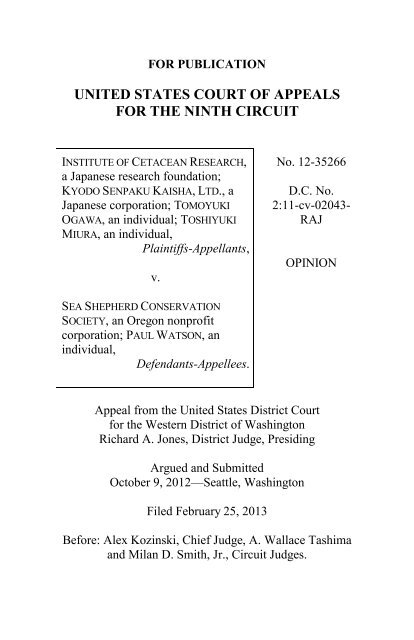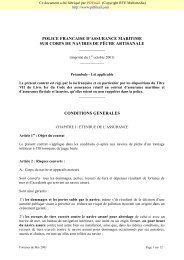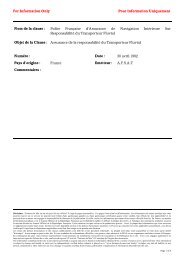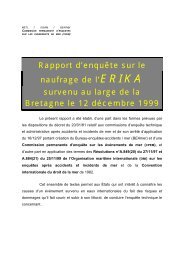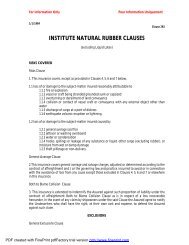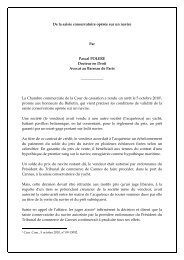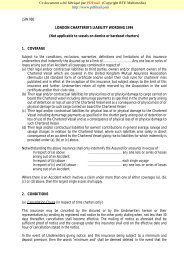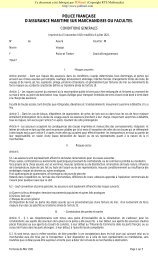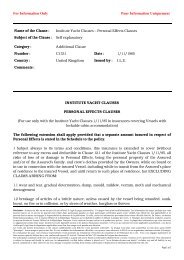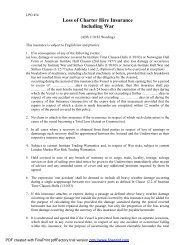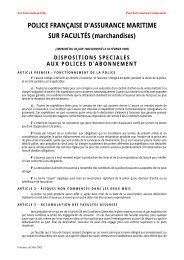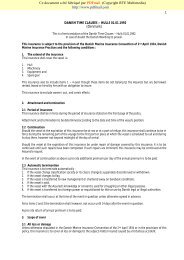Inst. of Cetacean Research v. Sea Shepherd - U.S. Courts
Inst. of Cetacean Research v. Sea Shepherd - U.S. Courts
Inst. of Cetacean Research v. Sea Shepherd - U.S. Courts
You also want an ePaper? Increase the reach of your titles
YUMPU automatically turns print PDFs into web optimized ePapers that Google loves.
FOR PUBLICATIONUNITED STATES COURT OF APPEALSFOR THE NINTH CIRCUITINSTITUTE OF CETACEAN RESEARCH,a Japanese research foundation;KYODO SENPAKU KAISHA, LTD., aJapanese corporation; TOMOYUKIOGAWA, an individual; TOSHIYUKIMIURA, an individual,Plaintiffs-Appellants,v.No. 12-35266D.C. No.2:11-cv-02043-RAJOPINIONSEA SHEPHERD CONSERVATIONSOCIETY, an Oregon nonpr<strong>of</strong>itcorporation; PAUL WATSON, anindividual,Defendants-Appellees.Appeal from the United States District Courtfor the Western District <strong>of</strong> WashingtonRichard A. Jones, District Judge, PresidingArgued and SubmittedOctober 9, 2012—<strong>Sea</strong>ttle, WashingtonFiled February 25, 2013Before: Alex Kozinski, Chief Judge, A. Wallace Tashimaand Milan D. Smith, Jr., Circuit Judges.
2INST. OF CETACEAN RESEARCH V. SEA SHEPHERDOpinion by Chief Judge Kozinski;Partial Concurrence and Partial Dissentby Judge Milan D. Smith, Jr.SUMMARY *Maritime LawThe panel reversed the district court’s orders denying apreliminary injunction and dismissing certain claims in anaction under the Alien Tort Statute brought againstenvironmental activists by Japanese researchers who huntwhales in the Southern Ocean pursuant to a permit issuedunder the International Convention for the Regulation <strong>of</strong>Whaling, art. VIII.The panel held that the whalers stated claims for piracy,defined under the United Nations Convention on the Law <strong>of</strong>the <strong>Sea</strong> and the High <strong>Sea</strong>s Convention as “illegal acts <strong>of</strong>violence or detention, or any act <strong>of</strong> depredation, committedfor private ends by the crew or the passengers <strong>of</strong> a privateship . . . and directed . . . on the high seas, against anothership . . . or against persons or property on board such ship.”The panel held that “private ends” are not limited to thosepursued for financial enrichment and that “violence” extendsto malicious acts against inanimate objects.Reversing the denial <strong>of</strong> the whalers’ motion for apreliminary injunction, the panel held that they were likely to*This summary constitutes no part <strong>of</strong> the opinion <strong>of</strong> the court. It hasbeen prepared by court staff for the convenience <strong>of</strong> the reader.
INST. OF CETACEAN RESEARCH V. SEA SHEPHERD 3succeed on the merits <strong>of</strong> their claims under three internationalagreements: the Convention for the Suppression <strong>of</strong> UnlawfulActs Against the Safety <strong>of</strong> Maritime Navigation, the UnitedNations Convention on the Law <strong>of</strong> the <strong>Sea</strong>, and theConvention on the International Regulations for PreventingCollisions at <strong>Sea</strong>. The panel held that there was a likelihood<strong>of</strong> irreparable harm, and the balance <strong>of</strong> the equities and thepublic interest favored the whalers. The panel held that thedistrict court abused its discretion in deferring to thejudgment <strong>of</strong> an Australian court because the United Statesdoes not recognize Australia’s claims <strong>of</strong> sovereignty overAntarctic waters. In addition, the unclean hands doctrine didnot apply. The panel remanded the case with instructions thatit be transferred to another district judge.Concurring in part and dissenting in part, Judge Smithconcurred in both the reasoning and the judgment <strong>of</strong> the panelopinion, reversing the district court’s dismissal <strong>of</strong> thewhalers’ piracy claims, and its failure to grant them apreliminary injunction. He dissented from the majority’sdecision to reassign the case to a different district judge.COUNSELMartha Christie Helmer, John Neupert (argued) and James L.Phillips, Miller Nash, LLP, Portland Oregon, for Appellants.Rachel Eve Buker, Daniel P. Harris (argued) and CharlesPhilip Moure, Harris & Moure, PLLC, <strong>Sea</strong>ttle, Washington,for Appellees.
4INST. OF CETACEAN RESEARCH V. SEA SHEPHERDKOZINSKI, Chief Judge:OPINIONYou don’t need a peg leg or an eye patch. When you ramships; hurl glass containers <strong>of</strong> acid; drag metal-reinforcedropes in the water to damage propellers and rudders; launchsmoke bombs and flares with hooks; and point high-poweredlasers at other ships, you are, without a doubt, a pirate, nomatter how high-minded you believe your purpose to be.Plaintiffs-Appellants (collectively, “<strong>Cetacean</strong>”) areJapanese researchers who hunt whales in the Southern Ocean.The United States, Japan and many other nations aresignatories to the International Convention for the Regulation<strong>of</strong> Whaling art. VIII, Dec. 2, 1946, 62 Stat. 1716,161 U.N.T.S. 74, which authorizes whale hunting whenconducted in compliance with a research permit issued by asignatory. <strong>Cetacean</strong> has such a permit from Japan.Nonetheless, it has been hounded on the high seas for yearsby a group calling itself <strong>Sea</strong> <strong>Shepherd</strong> Conservation Societyand its eccentric founder, Paul Watson (collectively “<strong>Sea</strong><strong>Shepherd</strong>”). <strong>Sea</strong> <strong>Shepherd</strong>’s tactics include all <strong>of</strong> those listedin the previous paragraph.<strong>Cetacean</strong> sued under the Alien Tort Statute, 28 U.S.C.§ 1350, for injunctive and declaratory relief. The statuteprovides a cause <strong>of</strong> action for “a tort . . . committed inviolation <strong>of</strong> the law <strong>of</strong> nations or a treaty <strong>of</strong> the UnitedStates.” 28 U.S.C. § 1350. <strong>Cetacean</strong> argues that <strong>Sea</strong><strong>Shepherd</strong>’s acts amount to piracy and violate internationalagreements regulating conduct on the high seas. The districtcourt denied <strong>Cetacean</strong>’s request for a preliminary injunctionand dismissed its piracy claims. We have jurisdiction over
INST. OF CETACEAN RESEARCH V. SEA SHEPHERD 5the order denying the injunction pursuant to 28 U.S.C.§ 1292(a). We also have jurisdiction to review the dismissal<strong>of</strong> the piracy claims because the district court’s reasoning fordismissing them is “inextricably intertwined with” its reasonsfor denying the preliminary injunction. Smith v. ArthurAndersen LLP, 421 F.3d 989, 998 (9th Cir. 2005) (internalquotation marks omitted).I. DISMISSAL OF THE PIRACY CLAIMSWe review the district court’s dismissal <strong>of</strong> <strong>Cetacean</strong>’spiracy claims de novo. Manzarek v. St. Paul Fire & MarineIns. Co., 519 F.3d 1025, 1030 (9th Cir. 2008). “[T]hedefinition <strong>of</strong> piracy under the law <strong>of</strong> nations . . . [is] spelledout in the UNCLOS, as well as the High <strong>Sea</strong>s Convention,”which provide almost identical definitions. United States v.Dire, 680 F.3d 446, 469 (4th Cir. 2012); see United NationsConvention on the Law <strong>of</strong> the <strong>Sea</strong> (“UNCLOS”), art. 101,Dec. 10, 1982, 1833 U.N.T.S. 397; Convention on the High<strong>Sea</strong>s, art. 15, Apr. 29, 1958, 13 U.S.T. 2312, 450 U.N.T.S.82. The UNCLOS defines “piracy” as “illegal acts <strong>of</strong>violence or detention, or any act <strong>of</strong> depredation, committedfor private ends by the crew or the passengers <strong>of</strong> a privateship . . . and directed . . . on the high seas, against anothership . . . or against persons or property on board such ship.”UNCLOS art. 101 (emphasis added); see also Convention onthe High <strong>Sea</strong>s art. 15.The district court’s analysis turns on an erroneousinterpretation <strong>of</strong> “private ends” and “violence.” The districtcourt construed “private ends” as limited to those pursued for“financial enrichment.” But the common understanding <strong>of</strong>“private” is far broader. The term is normally used as anantonym to “public” (e.g., private attorney general) and <strong>of</strong>ten
6INST. OF CETACEAN RESEARCH V. SEA SHEPHERDrefers to matters <strong>of</strong> a personal nature that are not necessarilyconnected to finance (e.g., private property, private entrance,private understanding and invasion <strong>of</strong> privacy). SeeWebster’s New Int’l Dictionary 1969 (2d. ed. 1939) (defining“private” to mean “[b]elonging to, or concerning, anindividual person, company, or interest”).We give words their ordinary meaning unless the contextrequires otherwise. See Leocal v. Ashcr<strong>of</strong>t, 543 U.S. 1, 8–9(2004); Antonin Scalia & Bryan A. Garner, Reading Law:The Interpretation <strong>of</strong> Legal Texts 69 (2012). The contexthere is provided by the rich history <strong>of</strong> piracy law, whichdefines acts taken for private ends as those not taken onbehalf <strong>of</strong> a state. See Douglas Guilfoyle, Piracy Off Somalia:UN Security Council Resolution 1816 and IMO RegionalCounter-Piracy Efforts, 57 Int’l & Comp. L. Q. 690, 693(2008) (discussing the High <strong>Sea</strong>s Convention); MichaelBahar, Attaining Optimal Deterrence at <strong>Sea</strong>: A Legal andStrategic Theory for Naval Anti-Piracy Operations, 40 Vand.J. Transnat’l L. 1, 32 (2007); see also Harmony v. UnitedStates, 43 U.S. (2 How.) 210, 232 (1844) (“The law looks to[piracy] as an act <strong>of</strong> hostility . . . being committed by a vesselnot commissioned and engaged in lawful warfare.”). Belgiancourts, perhaps the only ones to have previously consideredthe issue, have held that environmental activism qualifies asa private end. See Cour de Cassation [Cass.] [Court <strong>of</strong>Cassation] Castle John v. NV Mabeco, Dec. 19, 1986, 77I.L.R. 537 (Belg.). This interpretation is “entitled toconsiderable weight.” Abbott v. Abbott, 130 S. Ct. 1983,1993 (2010) (internal quotation marks omitted). Weconclude that “private ends” include those pursued onpersonal, moral or philosophical grounds, such as <strong>Sea</strong><strong>Shepherd</strong>’s pr<strong>of</strong>essed environmental goals. That the
INST. OF CETACEAN RESEARCH V. SEA SHEPHERD 7perpetrators believe themselves to be serving the public gooddoes not render their ends public.The district court’s interpretation <strong>of</strong> “violence” wasequally <strong>of</strong>f-base. Citing no precedent, it held that <strong>Sea</strong><strong>Shepherd</strong>’s conduct is not violent because it targets ships andequipment rather than people. This runs afoul <strong>of</strong> theUNCLOS itself, which prohibits “violence . . . againstanother ship” and “violence . . . against persons or property.”UNCLOS art. 101. Reading “violence” as extending tomalicious acts against inanimate objects also comports withthe commonsense understanding <strong>of</strong> the term, see Webster’sNew Int’l Dictionary 2846, as when a man violently poundsa table with his fist. Ramming ships, fouling propellers andhurling fiery and acid-filled projectiles easily qualify asviolent activities, even if they could somehow be directedonly at inanimate objects.Regardless, <strong>Sea</strong> <strong>Shepherd</strong>’s acts fit even the districtcourt’s constricted definition. The projectiles directlyendanger <strong>Cetacean</strong>’s crew, as the district court itselfrecognized. And damaging <strong>Cetacean</strong>’s ships could causethem to sink or become stranded in glacier-filled, Antarcticwaters, jeopardizing the safety <strong>of</strong> the crew.The activities that <strong>Cetacean</strong> alleges <strong>Sea</strong> <strong>Shepherd</strong> hasengaged in are clear instances <strong>of</strong> violent acts for private ends,the very embodiment <strong>of</strong> piracy. The district court erred indismissing <strong>Cetacean</strong>’s piracy claims.II. PRELIMINARY INJUNCTION“A plaintiff seeking a preliminary injunction mustestablish [1] that he is likely to succeed on the merits, [2] that
8INST. OF CETACEAN RESEARCH V. SEA SHEPHERDhe is likely to suffer irreparable harm in the absence <strong>of</strong>preliminary relief, [3] that the balance <strong>of</strong> equities tips in hisfavor, and [4] that an injunction is in the public interest.”Winter v. Natural Res. Def. Council, Inc., 555 U.S. 7, 20(2008). We review the district court’s denial <strong>of</strong> thepreliminary injunction for abuse <strong>of</strong> discretion. Harris v. Bd.<strong>of</strong> Supervisors, L.A. Cnty., 366 F.3d 754, 760 (9th Cir. 2004).“A district court would necessarily abuse its discretion if itbased its ruling on an erroneous view <strong>of</strong> the law or on aclearly erroneous assessment <strong>of</strong> the evidence.” Cooter &Gell v. Hartmarx Corp., 496 U.S. 384, 405 (1990).A. Likelihood <strong>of</strong> Success<strong>Cetacean</strong> sought its injunction pursuant to threeinternational agreements: the Convention for the Suppression<strong>of</strong> Unlawful Acts Against the Safety <strong>of</strong> Maritime Navigation(“SUA Convention”), art. 3, Mar. 10, 1988, S. Treaty Doc.No. 101-1, 1678 U.N.T.S. 222, the UNCLOS and theConvention on the International Regulations for PreventingCollisions at <strong>Sea</strong> (“COLREGS”), Oct. 20, 1972, 28 U.S.T.3459, 1050 U.N.T.S. 18.1. The SUA ConventionThe SUA Convention prohibits acts that endanger, orattempt to endanger, the safe navigation <strong>of</strong> a ship. SUAConvention art. 3. <strong>Cetacean</strong> presented uncontradictedevidence that <strong>Sea</strong> <strong>Shepherd</strong>’s tactics could seriously impairits ability to navigate. The district court nonethelessconcluded that, since <strong>Sea</strong> <strong>Shepherd</strong> has not yet disabled any<strong>of</strong> <strong>Cetacean</strong>’s ships, it’s unlikely it would succeed in thefuture. This was clear error. The district court overlookedthe actual language <strong>of</strong> the Convention, which prohibits
INST. OF CETACEAN RESEARCH V. SEA SHEPHERD 9“endager[ing]” safe navigation. Id. This requires only that<strong>Sea</strong> <strong>Shepherd</strong> create dangerous conditions, regardless <strong>of</strong>whether the harmful consequences ever come about. SeeWebster’s New Int’l Dictionary 843. As to whether <strong>Sea</strong><strong>Shepherd</strong>’s tactics actually are dangerous, the recorddiscloses that it has rammed and sunk several other whalingvessels in the past. See Appendix.The district court also erred by failing to recognize that<strong>Sea</strong> <strong>Shepherd</strong>, at the very least, attempted to endanger thenavigation <strong>of</strong> <strong>Cetacean</strong>’s ships. An attempt is sufficient toinvoke the SUA Convention, even if unsuccessful. <strong>Sea</strong><strong>Shepherd</strong>’s repeated claims that its efforts are merely“symbolic” and “employed so as to ensure maximum safety”are disingenuous. How else can it explain that it has switchedto metal-reinforced prop-fouling ropes? Reinforced ropescarry the same symbolic meaning as normal ropes, but theyare far more destructive. Nor does symbolism require <strong>Sea</strong><strong>Shepherd</strong> to bring its ships dangerously close to <strong>Cetacean</strong>’s.The district court’s conclusion that <strong>Cetacean</strong> wasn’t likely tosucceed on its SUA Convention claims rested on animplausible determination <strong>of</strong> the facts and an erroneousapplication <strong>of</strong> law; it was an abuse <strong>of</strong> discretion. UnitedStates v. Hinkson, 585 F.3d 1247, 1251 (9th Cir. 2009) (enbanc).2. The UNCLOSFor the reasons explained above, Part I, supra, the districtcourt erred in its assessment <strong>of</strong> <strong>Cetacean</strong>’s UNCLOS piracyclaims, and consequently abused its discretion in assessingthe likelihood <strong>of</strong> success on these claims. See Cooter & Gell,496 U.S. at 405.
INST. OF CETACEAN RESEARCH V. SEA SHEPHERD 11C. BALANCE OF EQUITIESThe district court correctly found that the balance <strong>of</strong>equities favors <strong>Cetacean</strong>. As it noted, “[a]bsent an injunction,the whalers will continue to be the victims <strong>of</strong> <strong>Sea</strong> <strong>Shepherd</strong>’sharassment,” but “<strong>Sea</strong> <strong>Shepherd</strong> . . . points to no hardship thatit will suffer if the court imposes an injunction.”D. PUBLIC INTEREST“The public interest inquiry primarily addresses impact onnon-parties rather than parties.” Bernhardt v. L.A. Cnty.,339 F.3d 920, 931 (9th Cir. 2003) (internal quotation marksomitted). This is particularly the case where “the impact <strong>of</strong>an injunction reaches beyond the parties, carrying with it apotential for public consequences.” Stormans, Inc. v.Selecky, 586 F.3d 1109, 1139 (9th Cir. 2009). The primarypublic interests at issue here are the health <strong>of</strong> the marineecosystem, Winter, 555 U.S. at 25–26; see also Earth Island<strong>Inst</strong>. v. U.S. Forest Serv., 442 F.3d 1147, 1177 (9th Cir.2006), and the safety <strong>of</strong> international waterways.Where a valid law speaks to the proper level <strong>of</strong> deferenceto a particular public interest, it controls. See Golden GateRest. Ass’n v. City & Cnty. <strong>of</strong> S.F., 512 F.3d 1112, 1126–27(9th Cir. 2008). Our laws defining the public interest inregards to whaling are the Whaling Convention Act and theMarine Mammal Protection Act, both <strong>of</strong> which permitwhaling pursuant to scientific permits issued under theWhaling Convention. 16 U.S.C. § 1372; 16 U.S.C. § 916c.<strong>Cetacean</strong>’s activities are covered by such a permit and thusare consistent with congressional policy as to the marineecosystem.
12INST. OF CETACEAN RESEARCH V. SEA SHEPHERDOur laws also reflect a strong public interest in safenavigation on the high seas. As already discussed, <strong>Sea</strong><strong>Shepherd</strong>’s activities clearly violate the UNCLOS, the SUAConvention and the COLREGS. See Part II.A, supra. Assuch, they are at loggerheads with the public interest <strong>of</strong> theUnited States and all other seafaring nations in safenavigation <strong>of</strong> the high seas.The district court also considered the interest in keepingU.S. courts out <strong>of</strong> the international political controversysurrounding whaling. But enjoining piracy sends no messageabout whaling; it sends the message that we will not toleratepiracy. This is hardly a controversial view, as evidenced bya joint statement from the United States, Australia, theNetherlands and New Zealand condemning dangerousactivities in the Southern Ocean. Joint Statement on Whalingand Safety at <strong>Sea</strong> from the Governments <strong>of</strong> Australia, theNetherlands, New Zealand, and the United States: Call forResponsible Behavior in the Southern Ocean WhaleSanctuary (Dec. 13, 2011), available athttp://www.state.gov/r/pa/prs/ps/2011/12/178704.htm.Refusing the injunction sends the far more troublesomemessage that we condone violent vigilantism by U.S.nationals in international waters.The district court also rejected <strong>Cetacean</strong>’s claims oninternational comity grounds. While there is a public interestin maintaining harmonious international relations, it’s not afactor here. An Australian court has entered default judgmentagainst <strong>Cetacean</strong>, purporting to enjoin it from whaling inAntarctic coastal waters over which Australia claimssovereignty. The district court’s deference to Australia’sjudgment in that case was an abuse <strong>of</strong> discretion. Asvesta v.Petroutsas, 580 F.3d 1000, 1009 (9th Cir. 2009). To begin,
INST. OF CETACEAN RESEARCH V. SEA SHEPHERD 13the district court misunderstood the Australian judgment,which addressed the legality <strong>of</strong> <strong>Cetacean</strong>’s activities, not <strong>Sea</strong><strong>Shepherd</strong>’s. Whatever the status <strong>of</strong> <strong>Cetacean</strong>’s whaling underAustralian law, it gives <strong>Sea</strong> <strong>Shepherd</strong> no license to engage inpiracy. It is for Australia, not <strong>Sea</strong> <strong>Shepherd</strong>, to policeAustralia’s court orders.Additionally, comity applies only if the foreign court hascompetent jurisdiction. Id. at 1011. But the United Statesdoesn’t recognize Australia’s claims <strong>of</strong> sovereignty overAntarctic waters. See Note from U.S. Deputy Representativeto the United Nations, to Secretary-General <strong>of</strong> the UnitedNations (Dec. 3, 2004); Note from Embassy <strong>of</strong> the UnitedStates, to Australian Department <strong>of</strong> Foreign Affairs and Trade(Mar. 31, 1995). By according comity to Australia’sjudgment, we would implicitly recognize Australia’sjurisdiction, in contravention <strong>of</strong> the stated position <strong>of</strong> ourgovernment. The conduct <strong>of</strong> foreign affairs is within theexclusive province <strong>of</strong> the Executive, see United States v.Hooker, 607 F.2d 286, 289 (9th Cir. 1979), and we must deferto its views, see Willams v. Suffolk Ins. Co., 38 U.S. (13 Pet.)415, 420 (1839); cf. Mingtai Fire Ins. Co. v. United ParcelServ., 177 F.3d 1142, 1147 (9th Cir. 1999).E. UNCLEAN HANDSAn injunction is an equitable remedy. Winter, 555 U.S.at 32. While the Winter factors “are pertinent in assessing thepropriety <strong>of</strong> any injunctive relief,” id., traditional equitableconsiderations such as laches, duress and unclean hands maymilitate against issuing an injunction that otherwise meetsWinter’s requirements. Here, however, the district courtabused its discretion in denying the injunction based on
14INST. OF CETACEAN RESEARCH V. SEA SHEPHERDunclean hands. Seller Agency Council, Inc. v. Kennedy Ctr.for Real Estate Educ., Inc., 621 F.3d 981, 986 (9th Cir. 2010).The district court held that <strong>Cetacean</strong>’s hands are uncleanbecause, “[i]n flouting the Australian injunction, the whalersdemonstrate their disrespect for a judgment <strong>of</strong> a domesticcourt.” Because neither the United States nor Japanrecognizes Australia’s jurisdiction over any portion <strong>of</strong> theSouthern Ocean, <strong>Cetacean</strong> owes no respect to the Australianorder. Moreover, the unclean hands doctrine requires that theplaintiff have “dirtied [his hands] in acquiring the right henow asserts, or that the manner <strong>of</strong> dirtying renders inequitablethe assertion <strong>of</strong> such rights against the defendant.” RepublicMolding Corp. v. B.W. Photo Utils., 319 F.2d 347, 349 (9thCir. 1963). <strong>Cetacean</strong> has done nothing to acquire the rightsto safe navigation and protection from pirate attacks; theyflow automatically from customary international law andtreaties. Nor is there anything remotely inequitable inseeking to navigate the sea lanes without interference frompirates.* * *The district court’s orders denying <strong>Cetacean</strong>’s preliminaryinjunction and dismissing its piracy claims are REVERSED.The preliminary injunction we issued on December 17, 2012,<strong>Inst</strong>. <strong>of</strong> <strong>Cetacean</strong> <strong>Research</strong> v. <strong>Sea</strong> <strong>Shepherd</strong> ConservationSoc’y, 702 F.3d 573 (9th Cir. 2012), will remain in effectuntil further order <strong>of</strong> this court. The district judge’snumerous, serious and obvious errors identified in ouropinion raise doubts as to whether he will be perceived asimpartial in presiding over this high-pr<strong>of</strong>ile case. Theappearance <strong>of</strong> justice would be served if the case weretransferred to another district judge, drawn at random, and we
INST. OF CETACEAN RESEARCH V. SEA SHEPHERD 15so order in accordance with the standing orders <strong>of</strong> theWestern District <strong>of</strong> Washington. The panel retainsjurisdiction over any further appeals or writs involving thiscase.
16INST. OF CETACEAN RESEARCH V. SEA SHEPHERDAppendixER 279
ER 281INST. OF CETACEAN RESEARCH V. SEA SHEPHERD 17
18INST. OF CETACEAN RESEARCH V. SEA SHEPHERDM. SMITH, Circuit Judge, concurring in part and dissentingin part:I concur in both the reasoning and the judgment <strong>of</strong> thepanel opinion, reversing the district court’s dismissal <strong>of</strong><strong>Cetacean</strong>’s piracy claims, and its failure to grant <strong>Cetacean</strong> apreliminary injunction. Even if one believes it is barbaric toharvest whales for any purpose at the beginning <strong>of</strong> the 21stcentury, as practiced by <strong>Cetacean</strong>, it is clearly permittedunder international law. See International Convention for theRegulation <strong>of</strong> Whaling art. VIII, Dec. 2, 1946, 62 Stat. 1716,161 U.N.T.S. 74. <strong>Sea</strong> <strong>Shepherd</strong>’s piracy is not. See Maj. Op.at 5–14.However, I respectfully dissent from the majority’sdecision to reassign this case to a different district judge.“We remand to a different judge only in unusualcircumstances or when required to preserve the interests <strong>of</strong>justice.” United States v. Wolf Child, 699 F.3d 1082, 1102(9th Cir. 2012) (citing United States v. Quach, 302 F.3d 1096,1103 (9th Cir. 2002)). Specifically, we employ a three-factortest to determine whether to remand a case to a differentdistrict judge:(1) whether the original judge wouldreasonably be expected upon remand to havesubstantial difficulty in putting out <strong>of</strong> his orher mind previously expressed views orfindings determined to be erroneous or basedon evidence that must be rejected, (2) whether
INST. OF CETACEAN RESEARCH V. SEA SHEPHERD 19reassignment is advisable to preserve theappearance <strong>of</strong> justice, and (3) whetherreassignment would entail waste andduplication out <strong>of</strong> proportion to any gain inpreserving the appearance <strong>of</strong> fairness.Id.; see also Wyler Summit P’ship v. Turner Broad. Sys., Inc.,235 F.3d 1184, 1196 (9th Cir. 2000).Applying these factors, I see no basis for reassigning thiscase. Our panel opinion is well-articulated, succinct, andabsolutely clear as to what is required <strong>of</strong> the district judge onremand. Importantly, it leaves no room for any district judgeto “have substantial difficulty . . . putting out <strong>of</strong> his or hermind previously expressed views.” Wolf Child, 699 F.3d at1102. The <strong>Sea</strong> <strong>Shepherd</strong>s are pirates. Period. No districtjudge could fail to grasp the clarity and firmness <strong>of</strong> ouropinion.Moreover, the “appearance <strong>of</strong> justice” does not requirereassignment. We have previously reserved reassignment foronly the most egregious cases. 1 While the district judge1See, e.g., United States v. Working, 287 F.3d 801, 809–10 (9th Cir.2002) (reassigning to different district judge where district court sentenceddefendant to one day in jail following conviction for assault with the intentto commit first degree murder); Quach, 302 F.3d at 1103–04 (reassigningwhere district court previously suggested that the defendant was“fortunate” not to receive the death penalty, and where the court indicatedthat had the government moved for a downward departure, it would havedenied the motion); United Nat. Ins. Co. v. R&D Latex Corp., 141 F.3d916, 919–20 (reassigning where district judge had “twice grantedsummary judgment” to a party without articulating any reasons); cf. WylerSummit Partnership, 235 F.3d at 1196 (refusing to remand to a differentdistrict judge even though district judge “adopted verbatim” one party’sclearly biased proposed order); United States v. Waknine, 543 F.3d 546,
20INST. OF CETACEAN RESEARCH V. SEA SHEPHERDclearly erred in finding for the <strong>Sea</strong> <strong>Shepherd</strong>s, there isabsolutely no evidence in this record to suggest that he did s<strong>of</strong>or an improper purpose, such as bias or prejudice.Finally, because I do not believe “preserving theappearance <strong>of</strong> fairness” requires reassignment, the majority’sdecision will necessarily “entail waste and duplication out <strong>of</strong>proportion” to any benefits. Wolf Child, 699 F.3d at 1102.District judges, like circuit judges, occasionally makemistakes. Where, as here, there is no reason to suspect thatthe district judge will repeat those mistakes on remand,reassignment is inappropriate.I respectfully dissent from the majority’s decision toreassign this case to a different district judge.560 (9th Cir. 2008) (refusing to reassign to a different district judgedespite commission <strong>of</strong> significant procedural errors).


